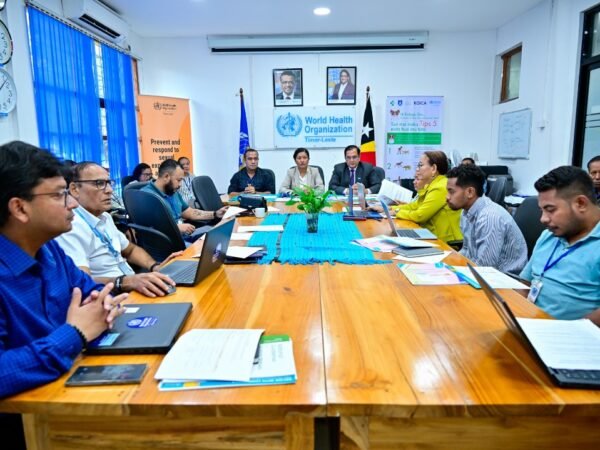Dili, November 5, 2025 (Média Democracia) – The Ministry of Health (MS), together with the National Task Force for Rabies, the World Health Organization (WHO), and other partners, has concluded training for around 500 health and veterinary workers across Timor-Leste aimed at strengthening rabies management and control.
The Vice Minister of Health, José dos Reis Magno, stated that the training was designed to ensure that all health workers nationwide adhere to national guidelines for rabies prevention and case management.
“This training helps ensure that all health workers know exactly what to do when a patient is bitten by a dog,” said Vice Minister José dos Reis Magno.
He further explained that since the first reported cases of rabies in previous years, 22 people in Timor-Leste have been infected, 20 of whom have died in 2025, making rabies a serious public health emergency.
The WHO Representative, Arvind Mathur, explained that the training covered key topics, including how to classify exposure cases, clean and treat bite wounds, administer rabies immunoglobulin (RIG) and vaccines, and use digital surveillance tools such as the Timor-Leste Health Information System (TLHIS) and the Integrated Case-Based Surveillance (ICBS) platform.
“This national training, known as a ‘Master Training’, was conducted over two days from 15 to 16 October for doctors, veterinarians, surveillance officers, and laboratory personnel. It included group discussions, case studies, and practical exercises based on WHO materials and national guidelines,” explained Mathur.
The WHO Representative further noted that the training was implemented in three phases, targeting medical doctors, vaccinators, nurses, surveillance and health promotion staff, veterinarians, and health information focal points at both municipal and national levels. The first phase included participants from Covalima, Bobonaro, RAEOA, Ermera, Liquica, Manufahi, and Manatuto (21–22 October); followed by Aileu, Ainaro, Dili, and Atauro (23–24 October); and finally Baucau, Viqueque, and Lautem (28–29 October).
“This effort supports the National Strategic Plan to Eliminate Rabies, developed by the Ministry of Health (MS) and the Ministry of Agriculture, Livestock, Fisheries, and Forestry (MAPPF), with support from WHO, WOAH, DFAT, and DAFF. The plan adopts the ‘One Health’ approach and aims to eliminate human rabies transmitted by dogs by 2030,” Mathur added.
He noted that during the training, participants discussed key challenges such as how to manage bite wounds, administer RIG in hard-to-access areas of the body, and how to respond when there are interruptions in vaccine supply. They also discussed the need for adequate vaccine stocks, transportation to remote areas, and more veterinary staff to support dog vaccination campaigns. Stronger inter-sectorial coordination and faster reporting of confirmed cases were identified as crucial next steps.
In addition to the training, community awareness is also considered essential. In September and October, the Ministry of Health and WHO conducted Risk Communication and Community Engagement (RCCE) activities in Bobonaro and Oe-Cusse. The next rounds in Covalima and Ermera will take place in early November and will reach over 9,000 students across 26 schools, teaching them how to avoid dog bites and seek medical assistance immediately.
Reporter: Nelfiano
Photo: WHO Media

